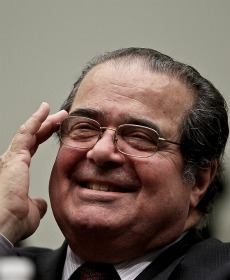
Valiantly Protecting Corporations From Consumers
Scott Lemieux
Earlier this year, a unanimous Supreme Court rejected claims by AT&T that the corporation had "personal privacy" rights that should be protected. Chief Justice John Roberts capped his opinion for the Court with a flourish: "We trust that AT&T will not take it personally." In the wake of this case and a few other losses suffered by business interests, some Court observers argued that the Roberts Court's reputation as a champion of corporate interests is unearned.
|
|
|
 |
|
|
Antonin Scalia (Flickr/The Higgs Boson) |
But this week's AT&T decision reminds us just how corporate friendly this court really is.
Wendesday's ruling in AT&T Mobility v. Concepcion involved the practice of what's called "binding arbitration." Typically, if you have a legal dispute you go to court to get it resolved, but some contracts contain provisions that force you to give up your right to sue. Instead, you go through "arbitration," in which disputes are resolved informally by a third party. Think of it as a sort of privatized judiciary. The advantages to companies are clear: disputes are resolved more quickly and arbitrators selected by corporations are likely to be favorable to corporate interests.
Arbitration clauses are often included in agreements for products like cell phones and credit cards, and AT&T had one in the contract signed by Vincent and Liza Concepcion, who were charged $30 for a "free" telephone by AT&T. Of course, 30 bucks on its own is hardly worth suing over. But the contract also made the couple waive their right to join other AT&T customers and bring a big claim -- even in arbitration court -- on behalf of everyone who was ripped off. Thankfully, in California it's illegal to make someone sign away their right to a class-action arbitration, so that's just what the Concepcions did.
In its defense, AT&T has argued that the California rule was inconsistent with federal law. This was based on the Federal Arbitration Act, which requires that agreements to go to arbitration be accepted "save upon such grounds as exist at law or in equity for the revocation of any contract." Federal law, in other words, recognizes that state law might forbid some kinds of contracts in general, but you can't ban the use of arbitration across the board. The obvious problem with AT&T's argument is that the California rule did not discriminate against arbitration agreements on the whole. It simply said you can't make consumers abandon their right to one. Both the U.S. District Court and a unanimous 9th Circuit panel rejected AT&T's argument.
But the corporation found a more sympathetic ear at the Roberts Court. Justice Antonin Scalia's opinion for the bare five-member majority is striking in its pro-business slant. Less than a month after the same five justices were notably indifferent to the suffering of a man wrongly put on death row because of prosecutorial misconduct, the Court's Republican appointees recovered their empathy. They worried about what harm could befall a corporations if the California rule was allowed to stand. "Faced with even a small chance of a devastating loss," Scalia warned, "defendants will be pressured into settling questionable claims." Translation: Poor little AT&T might be "pressured" by threat of legal action to give in to customers, even when it just might be right.
The argument seems to miss the point that it's usually consumers who need protection, but that's not the only point the majority opinion missed. As Justice Breyer's persuasive dissent explains, this ruling makes it very difficult for consumers to fight small-stakes violations of their rights: "What rational lawyer would have signed on to represent the Concepcions in litigation for the possibility of fees stemming from a $30.22 claim?" The California rule on class-action arbitration was meant to address that problem, but the Justices in the majority offered no serious rebuttal to this objection. Nor does Scalia's opinion address the extent to which the arbitration process -- in which the arbitrators are not impartial but are selected by corporations -- is stacked against consumers.
These policy considerations would be beside the point if the Federal Arbitration Act clearly preempted the California rule, but it doesn't. The plain language of the Arbitration Act fits with the lower courts' rulings. States aren't required to favor arbitration, only to keep it on equal footing with traditional litigation. The strain required to read the California rule as discriminating against arbitration agreements just reflects how solicitous to powerful business interests the Court really is.
Nor can the outcome in AT&T v. Concepcion be justified by broader conservative constitutional principles. The Court's conservatives are allegedly committed to federalism -- that is, states' rights -- but here they called for federal uniformity. (Some of these same justices are likely to argue against federal uniformity when the Affordable Care Act and its alleged intrusion on state sovereignty comes up). From the Fugitive Slave Act to the Federal Partial-Birth Abortion Act, alleged conservative commitments to "federalism" rarely survive clashes with cherished conservative interests, and Wednesday's ruling is another case in point.
As a few cases earlier in the term reflect, the strong pro-corporate, anti-consumer disposition of the Roberts Court is not absolute. But it's important to remember that these cases are very much the exception, not the rule. We've even had studies to show this: The Roberts Court tendency to favor business interests is very strong. And the Court's bias in favor of groups that are already grossly over-represented in the political process is not easy to reconcile with our expectation of what courts should do: protect the downtrodden.
Scott Lemieux is Assistant Professor of Political Science at The College of Saint Rose. He contributes to the blogs Lawyers, Guns, and Money and TAPPED.
April 29, 2011
